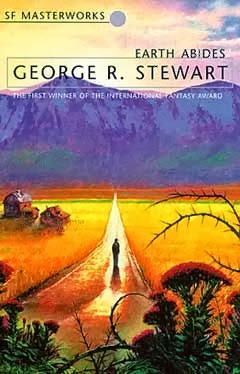As SF sub-genres go, I love a good apocalypse, and the first part of Earth Abides, titled "World Without End," was no exception. That sub-title is indicative of the sort of apocalypse Stewart imagined, one where humans were nearly wiped out, but the rest of the world continued. The events are related by Ish, who initially seems to be the only survivor of a devastating pandemic. Having been in the country doing research when the pandemic struck, he is unaware of the death of the human race. Stewart artfully reveals the extent of the devastation through Ish's journey in from the country to San Francisco, so that both Ish and reader learn how bad things are together. The destruction felt conventional, arguably because of the temporal distance between myself and this seminal work, published in 1949. Numerous apocalyptic scenarios have been inspired by Earth Abides, most famously Stephen King's The Stand, a book I read as religiously as St. John's Apocalypse in my youth.
The move from apocalypse to post-apocalypse was less compelling for me. I guess I like to watch the world burn, not get rebuilt. Once Ish and his little enclave of survivors begin to live life after people (one has to wonder about the intertextual conversation of the History Channel series Life After People and works like Earth Abides - both are speculative works, after all), I found the narrative less compelling. The last two sections of the book are nevertheless artful post-apocalyptic conjectures, albeit ones which illustrate post-WWII American sentiments and biases.
These sentiments and biases were among the most engaging parts of the text for me. After all, there is an interesting meta-fictional intersection in the idea that "Language changes, but the text remains the same." I first learned of this concept from Dr. Michael Drout of Wheaton College, but agree entirely in the idea of the text as an artifact, a frozen moment in time. I can imagine Earth Abides as a time capsule from an alternative earth, where there really was a pandemic that nearly wiped out the entire human race. And in reading it, the text freezes Stewart's post-WWII American perspective, complete with its now-anachronistic views of madness, STDs, essential gender differences, and morality.
Of all these views, the one I found most surprising was the lack of religious sentiment in a book that relies so heavily upon biblical allusion. From the title of the book, which quotes Ecclesiastes 1:4 to the italicized sections of text which echo Biblical language, but seemed to me to be the voice of the Earth, the book has a decidedly biblical feel to it. But that biblical feel is one without the God of Abraham and the Church. Ish and the survivor do not reinstate the dominant religion of America, despite the ubiquity of churches in the US in the post-war era. Instead, Stewart seems to be playing with ideas of Earth Goddess in the character of Em, Ish's African-American wife. He refers to her as "Mother of Nations" (276), and renders her one of the most noble and admirable characters. While Ish is a limited first-person narrator, the italicized sections are clearly the voice of an omniscient third-person narrator, which I assume is the voice of the Earth herself. I assume a feminine voice, due to the potential connections I see between that voice and the character of Em. This is not a literal connection mind you, but a thematic one. Speculative scholars doing work on Ethnicity and Gender should find much to say about Em and the voice of the Earth.
But even if we accept the italicized soliloquy-like passages as the voice of the Earth, Earth Abides is still a decidedly secular apocalypse, a movement in literature going back to Mary Shelley's Last Man. What we see here is not the end of the world with the coming of a New Jerusalem, but the end of mankind. Stewart's Earth Abides does the same thing for post-war America that H.G. Wells' War of the Worlds did for Britain. It challenged the idea of a Manifest Destiny or the imago dei by imagining a scenario wherein we are brought to the brink of destruction, and then saving a remnant, not by God's hand, but by the caprice of biology and natural selection. This is an area I'll continue to explore in my reading, as I think SF offers us godless apocalypses regularly--it is due to works like Earth Abides that we no longer think of the word apocalypse as a revelation, but as devastation. While it didn't grip me all the way through, I'm in full agreement with Mike Resnick, who said of Earth Abides: "A beautiful book, one that should never be allowed to go out of print."
Intertexts: Everything from the Bible to the recent video-game Plague Inc. It was fascinating for me to consider that a nuclear holocaust was not the only fear post-WWII SF writers were speculating upon. While recent films like Contagion explore the dread of a global, civilization-shattering pandemic, it is one that has been with us much longer - I was just surprised to see how far back this went, having assumed this sort of fear was gaining currency with Michael Crichton's Andromeda Strain. I was also impressed by Earth Abides predating both 28 Days Later and The Walking Dead with the idea of the recovering convalescent emerging from an illness into a world that has been utterly changed. However, as I've already stated, Earth Abides is a richer read if you can catch all the Biblical allusions.
Secondary Sources:
Scott, Donald M. Life And Truth Of George R. Stewart: A Literary Biography Of The Author Of Earth Abides / Donald M. Scott. Jefferson, N.C. : Mcfarland, 2012.
Wells, Elizabeth. "Earth Abides: A Return To Origins.(Critical Essay)." Extrapolation 3 (2007): 472-481.
ABSTRACT: Stewart's fictional exploration of the "end of the world" offsets the contingent and unquantifiable nature of "Armageddon" by deploying some of the following stages of action: (1) the experience or discovery of the cataclysm; (2) the journey through the wasteland created by the cataclysm; (3) settlement and establishment of a new community; (4) the re-emergence of the wilderness as antagonist; and (5) a final, decisive battle or struggle to determine which values shall prevail in the new world. It is perhaps noteworthy that this movement, mirroring a cyclical process of cataclysm-regeneration-civilization, does not only re-articulate the prodigal son paradigm offered by Robinson Crusoe, but recalls the "movement out to an unknown periphery or movement inward" of the archetypal "heroes in motion" which characterized the genre of the novel from its inception.
Teaching Tips: Obviously, Earth Abides is a must-have text in a study of apocalyptic and post-apocalyptic fiction, but instructors working in literature departments at Liberal Arts colleges and universities affiliated with Christian denominations would find this a challenging work to include in courses looking at the Bible in modern fiction. Check out Krista Karyn Hiser's "Pedagogy Of The Apocalypse" in Transformations: The Journal Of Inclusive Scholarship And Pedagogy for a suggested approach for constructing a course on the end of the world.
Potpourri: I can't do better than to recommend downloading Plague Inc. from Ndemic Creations. It's a clever strategy game built for iOS and Android platforms, where you try to build a deadly pathogen to bring about the very sort of apocalypse George R. Stewart imagines in Earth Abides. It's dark entertainment if you take it too seriously - my son thinks I'm a terrible person for playing it -- given that you only win if everyone dies. I have to admit, there's something chilling about watching the population of Canada drop to zero, while I sit there orchestrating my own demise.









No comments:
Post a Comment